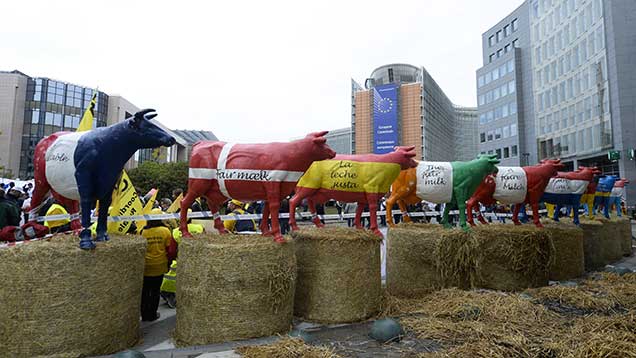Farm support package falls short, say industry leaders
 © Isopix/ Rex Shutterstock
© Isopix/ Rex Shutterstock Industry leaders have voiced disappointment at a support package from Brussels to help farmers struggling with the slump in commodity prices.
The European Commission unveiled what it described as a “comprehensive package of measures” after thousands of farmers took to the streets of Brussels.
See also: Doubts cast on prompt direct payments to farmers
The day of action on Monday (7 September) saw an estimated 6,000 farmers and 2,000 tractors from across EU member states descend on the European capital.
As farmers clashed with riot police, agriculture ministers, commission officials and farm union leaders held talks in a series of meetings.
The commission’s support package includes €500m for dairy farmers and other measures Brussels says will ease cashflow pressures, while addressing imbalances in supply and demand.
(See the European Commission – Fact Sheet on the support package)
But many of the measures are works in progress – including a package of targeted aid, which is yet to be finalised for member states most affected by low dairy prices.
About 70 UK farmers travelled to Brussels from England, Scotland, Wales and Northern Ireland.
NFU president Meurig Raymond, who led a delegation of 40 NFU members, said it was uncertain how many British farmers would benefit from the package.
“We appreciate the €500m for dairy farmers across Europe, particularly as this comes at a time when EU budgets are under tremendous pressure,” said Mr Raymond.
But he added: “It is currently unclear how much of this would come to Britain.”
It is unclear when farmers will receive their basic payment this coming winter – despite moves by Brussels to allow 70% of the money to be paid from 16 October.
Defra has suggested it will only be able to pay farmers promptly when the payment window opens on 1 December if Brussels relaxes controls regarding CAP expenditure by member states.
Mr Raymond also voiced disappointment at other measures.
“It is disappointing that the commission won’t review the intervention price in the dairy sector because we feel it has a role to play,” he said.
“An increase in the price could help put a price floor in the market and boost confidence in the dairy sector. We will continue to press the commission on this point.”
That view was echoed by Dairy UK chief executive Judith Bryans.
She said: “Increasing the intervention price would help stabilise the market and give the dairy industry a much-needed immediate relief.”
NFU Scotland president Allan Bowie said action should be to help the wide range of farm sectors struggling in the face of low prices, extreme market volatility and challenging weather.
Mr Bowie said: “First and foremost, Europe’s agricultural commissioner Phil Hogan must show stronger recognition that this is a crisis situation.”
Ulster Farmers Union president Ian Marshall said the support package was poor and predictable.
He added: “We have pushed hard to get to this point, but we are going to have to push a lot harder to get the commission to deliver something more meaningful.”
The aid package was described as “far from sufficient” by Copa-Cogeca, the umbrella organisation for European farm unions, which organised the protest in Brussels.
Copa-Cogeca secretary-general Pekka Pesonen said farmers were bearing the brunt of international politics – especially Russian trade restrictions.
He said: “Farmers are suffering enormously from the severe situation hitting the EU agriculture market, especially in the EU pigmeat, dairy, fruit and vegetable, and beef sectors.
“It is clear that an aid package of €500m is nowhere enough to compensate farmers for the loss of their main export market Russia worth €5.5bn annually.
“EU farmers are paying the price for international politics. Prices are below production costs in many countries and farmers’ incomes half the average level, forcing some to close down.”
There were a few positive elements in the package, said Mr Pesonen. But it fell short of expectations and would have little noticeable impact.
“It includes very few measures to help manage the market or deal with the increasing volatility and short-term problems,” he said.
“We welcome the fact that EU promotion schemes have been boosted and the commission will speed up work to find new markets, but this takes time.
“The commission knows there is a huge crisis in the sector but is refusing to treat it.”
